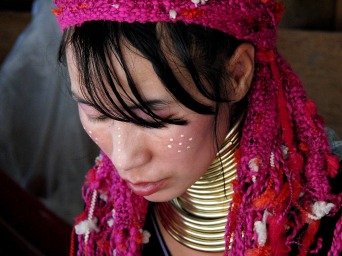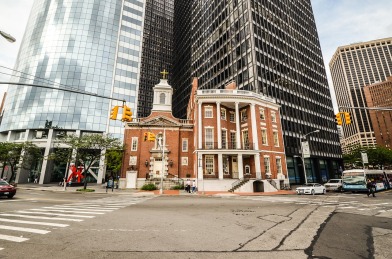Does the United Church of Christ (UCC) have a big-city, big-church, liberal bias? I’ve been hearing UCC lay people—and remarkably, pastors—level this charge, in three different Conferences and in various churches, since my “privilege-of-call” days in the Potomac Association of the Central Atlantic Conference in the early 1990s. Two recent instances:
- This past spring, a UCC pastor acquaintance complained to me that “those folks in Cleveland” (i.e., our denomination’s national staff) “do small and rural churches a disservice” when they “push us to become Open and Affirming,” embrace the Black Lives Matter movement, and advocate for social justice. He asked: “Why don’t they just stop talking and leave us alone?” For reasons I don’t understand, my colleague confronts and regales me with this message every chance he gets. Sometimes I succeed in avoiding him.
- In April 2016, a respondent to one of my postings on this blog site wrote: “I’m a liberal member of a politically moderate congregation…. We recently voted to allow same gender marriage, but not to become ONA, a decision I supported. The attitudes of the conference and national UCC towards my more conservative brothers and sisters does nothing but alienate and disparage them, and certainly does not bring them to church. I agree with 99% of the social justice issues the UCC supports, but I am tiring of the condescension towards my brothers and sisters who believe differently than I do. We disagree on many issues but serve the same Jesus.”
Do these church leaders and pastors have a point? Does the UCC have a big-city, big-church, liberal bias?
These questions have particular salience because, by the UCC’s own admission, “nearly half (46.5%) of all UCC congregations have 50 or fewer people in worship each week, and nearly 8 in 10 [UCC] congregations (79.5%) have 100 or fewer people in worship.” Thus, “the United Church of Christ is a denomination of small churches”—and such churches are “more likely to have a majority of participants possessing conservative theological [and perhaps, political and socio-cultural] outlooks.” Moreover, small churches “adap[t] less readily to change”/are “not as willing to make changes,” and are “more uncertain about their future” (“FACTs on Smaller Congregations: Findings from the United Church of Christ 2015 Faith Communities Today [FACT] Survey of Congregations”).
So, given this reality—that the UCC is made up predominantly of smaller congregations, and that such churches have conservative, risk-averse and resistant-to-change tendencies—why is our denomination so insistent on embracing a progressive theology, advocating for social justice, and speaking truth to power? Doesn’t that prove that the UCC has a big-city, big-church, liberal bias?
Conservative talk radio host Dana Loesch asks similar questions about American politics, culture, and the media in her recent book, Flyover Nation: You Can’t Run a Country You’ve Never Been To (Sentinel, 2016). According to Loesch, the “heartland” of America is virtually a foreign country to business, academic, political, and cultural elites in Washington, D.C., Los Angeles, New York, and Silicon Valley; states like Iowa, Nebraska, and Oklahoma are just places New Yorkers and Californians fly over during their trans-coastal travel. “America is fracturing into two countries,” she writes—“not North and South, but Coastal” (urban) and “Flyover” (rural). Worse, these elites “don’t understand the first thing about how most of the country thinks and lives.”
Does Loesch’s condemnation of America’s coastal elites also apply to the UCC? Some UCC people think it does.
It has been 47 years since British zoologist Desmond Morris noted “a fundamental clash between the cohesive and inventive forces of society”—that is, between conformity and innovation. The one tends to keep things steady, repetitive, and static. The other strains on to new developments and the rejection of old patterns. Only in the city [can] sustained innovation [flourish]. Only the city is strong enough and secure enough to tolerate the disruptive forces of rebellious originality and creativity. The sharp swords of iconoclasm [produce] mere pinpricks” in the city’s underbelly, “giving it a pleasant tingling sensation, rousing it from sleep and urging it into [creative] action” (The Human Zoo: A Zoologist’s Classic Study of the Urban Animal [New York: Kodansha, 1996], p. 38).
We may well question Morris’ argument that sustained innovation can only take place in cities—but don’t we see something of this empirically? According to the UCC’s “2015 Faith Communities Today Survey of Congregations,” growing churches “emphasi[ze] working for social justice;” “ha[ve] greater percentages of LGBT participants in the congregation;” “expres[s] a willingness to change to meet new challenges;” and are “racially and ethnically diverse.” Cities are friendlier, more welcoming environments for such progressive congregations than the countryside.
By the same token, rural cultures and churches tend to be socially conservative. One of the recurring problems that bedevil Peace Corps volunteers, political scientists and economists, and western development agencies when they do modernization work in agrarian African, Asian, and Latin American societies, is that indigenous peoples tend not to trust western “experts” with their fancy pedigrees, their know-it-all attitudes and efficiencies, and their scientific medical, agricultural, and educational techniques. They don’t want to surrender their traditional ways to change, innovation, and progress.
Something of this mindset also exists in rural communities and churches throughout the United States. It can also be found in rural UCC congregations. Yet, those who live in such communities, and the congregants of rural churches, are hardly “backward.” Even rural folks watch the latest television shows and movies, shop at the mall, and go to Las Vegas and Europe on their vacations; thus, they are exposed to social change and innovation. So it is hard to say how resistant to change rural communities and congregations really are.
Does the UCC have a big-city, big-church bias? Well…no. Our denomination does not “push” churches to become Open and Affirming, to embrace the Black Lives Matter movement, or to adopt a social justice agenda. Have you looked at the UCC website (UCC.org) recently?—I mean, have you really looked at it? Click on any item in the “About Us” pull-down menu, and you’ll learn about UCC inclusion, you’ll read the UCC Statement of Faith, and you’ll discover how God is still speaking, and how the UCC is a united and uniting church. But you won’t find the UCC “pushing” churches to do anything.
Indeed, what is apparent to me is that the UCC does not have a big-city, big-church bias, but it does have a vitality bias and an inclusivity bias. It wants all of its congregations to become healthier, more connected to their communities (and to our denomination), and more hopeful about their future.

Rev. Chris Xenakis is a UCC pastor currently serving Groton Community Church (UCC) in Central New York. In addition, he is an adjunct lecturer at SUNY-Cortland, teaching courses this year on world politics, democracy, U.S. foreign policy and multiculturalism. Chris has written numerous books and articles, which can be found on his blog.






With over 40 years in rural church ministry in the UCC, I’m glad the UCC doesn’t like stereotypical images or I might think the author sees rural life as People “With their God and guns.” I keep waiting for urban congregations to catch up with us rural folk on Native American Rights, the Environment, food quality and safety, the dangers of white nationalist groups. Some of us in rural ministry have been wanting to talk about these things and others since the eighties with no takers. I think of the national staff person on a visit to South Dakota commented to me on how they now understood that rural wasn’t a five acre horse farm outside of DC.
Serving three congregations on the Canadian Boarder in Far Northern Minnesota, 6 hours from the Twin Cities but only three from Winnipeg. But if you don’t see Urban Bias, you probably got it! I was given the answer to your question 40 years ago. Why does a denomination with more small town and rural churches have an urban bias? Because the majority of members and economic resources come from larger congregations in Metro areas and because we are a political organization rural and small town congregations lack the economic and political power to be heard. So we are dismissed with platitudes and yes stereotypical images. Come out and see us some time! But remember we do have lions and wolves and bears! “O My” (also GLBTQ folk, racial diversity, poverty, poor health care, poor broadband service, and many progressive folk working for change.)
John Tschudy
LikeLike
Thank you for this article. It resonates with my personal experience as a UCC minister in the MN conference.
LikeLike
So here are my two cents. Your article is very true. But are you embracing an inclusive agenda to the exclusion of those that want to pursue alternatives. I personally am opposed to Open and Affirming. I am opposed to same sex marriage. I am opposed to the agenda of the Black Lives Matter movement. However, I feel that I have to agree with those agendas in order to be a member of the UCC. The “push” is not overt but covert. It is not out in the open but in the undertones of what the church does in missions, ministry, worship, and education. It has gotten to the point where I do not go to church anymore. I grew up in the UCC, but I do not consider myself a part of the UCC. My 2xGreat Grandfather was a Professor of New Testament Theology at Lancaster Theological Seminary, my Great Grandfather and Grandfather were both Pastors in the German Reformed Church. I continue to search for a real German Reformed Church in my area to visit and look at seriously. I have family in Ohio and I want to attend a service at a Calvin Synod Church for the expereince and renewal that I will probably feel At one time I considered a call to ministry but put it aside because some of the theology that has been advocated is way to out there for me. So the UCC can be a left wing urban church if they want to be they just have to be ready to cut loose the rural more conservative churches. Are you okay with that?
LikeLiked by 1 person
If you read the Facebook postings by the UCC, it is clear that every far left political position is embraced and promoted. If you are a UCC church looking for a minister, you will find the pool of those under retirement age are far politically left. You will not find the pool includes ministers that have the evangelical view that salvation is only provided by the personal acceptance of Christ as Savior.
LikeLike